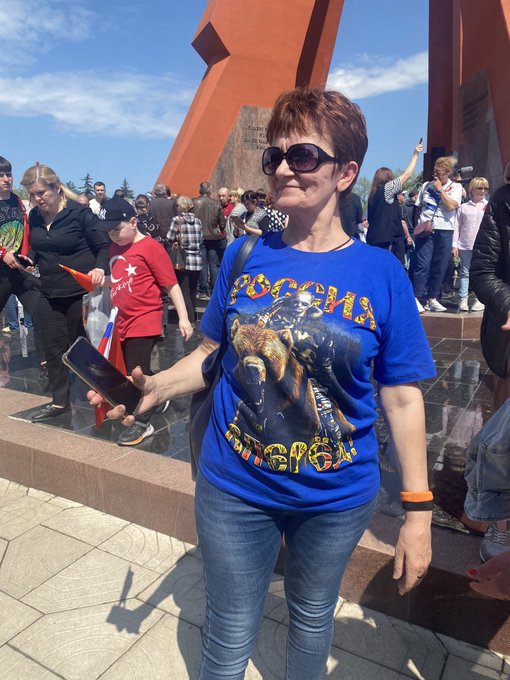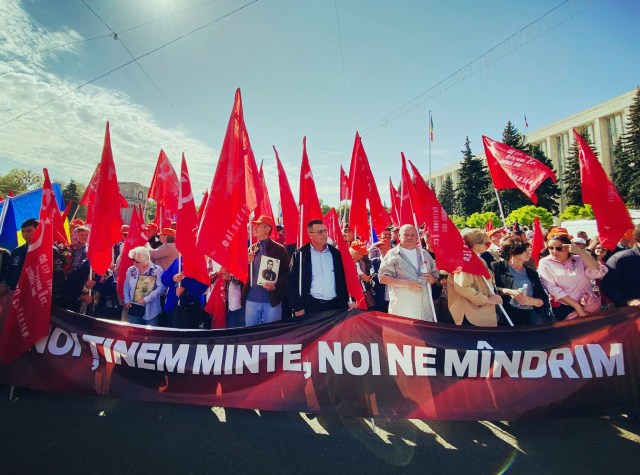Victory Day in Chișinău.

Chișinău, Moldova
There’s a joke in Moldova that the country could defend itself against a Russian invasion for two hours, that being the length of time it would take a tank to drive into the capital Chișinău from the Russian-backed breakaway region of Transnistria. Chișinău’s broad central Stefan cel Mare boulevard is a showpiece of the kind of Stalinist urban planning designed to allow tanks to travel unimpeded into a city’s urban core: the hope here is that this will not be put to the test.
Moldova’s army, less than 5,000-strong, is entirely unprepared for war, but war has now come to Moldova’s borders. The Ukrainian port city of Odessa, the seizure of which is an open Russian aspiration, is only 150 miles away, and tens of thousands of Ukrainian refugees have swollen Moldova’s tiny population. At the same time, a series of mysterious bombings and grenade attacks in Transnistria, blamed by Russia on Ukraine and by Ukraine on Russia, have further heightened anxieties that something bad is in the offing.
“Russian intelligence operations could have been behind the explosions, not particularly to push the region into war in Ukraine,” Denis Cenusa, a Moldovan security analyst, told me, “but rather to ‘test’ the reaction of decision-makers in Kyiv, Chișinău and the West. That explains why the explosions have so far been well-choreographed, with no casualties and minimal damage. They may also be an attempt by local actors in the breakaway region to extort concessions from Chișinău.”
Part of the Soviet Union until 1992, Moldova’s existence as a fully independent state has never quite seemed permanent, with its political life centred around the binary choice of on the one hand a closer relationship with Russia, and on the other EU membership and closer links — perhaps even unification — with Romania. Since Russia’s war in Ukraine intensified in February, Moldova’s West-leaning government under President Maia Sandu and Prime Minister Natalia Gavrilița has applied for EU membership, and the President of the European Council, Charles Michel, has promised enhanced European security assistance. Yet despite its mostly Romanian-speaking population, with its gold-domed churches and stuccoed Tsarist-era townhouses, Red Army memorials and space-age Soviet Modernist government buildings, Moldova’s capital Chișinău still has something of the air of a provincial Russian city, with Russian-speaking families strolling beneath the chestnut trees of its central Pushkin Street.
Historically part of the Romanian lands, the territory of what would become Moldova was carved from the Ottoman Empire by Russia in the early 19th century, as part of Moscow’s attempted expansion towards the Balkans. Granted to Romania after the First World War, it was then annexed by the Soviet Union in 1940, coming back under German-allied Romanian occupation before falling to the advancing Red Army in 1944. This year, in the run up to the annual Victory Day Parade yesterday, the politics of wartime memory were more contested.
Since the beginning of his war with Ukraine in 2014, Putin has made the symbolism of the Red Army’s victory against Nazism a difficult one for his neighbours to manage, especially now that Russian troops are raising the Soviet Victory Banner over conquered Ukrainian cities. Putin’s elevation of the St George’s Ribbon to a symbol of revanchist Russian nationalism has led Moldova’s liberal government to ban it. In return, Moldova’s Russia-leaning, socially conservative opposition Socialist party vowed to defy the ban and display the Ribbon at the Victory Day march. A recent RUSI report, citing Ukrainian intelligence sources, claims that this Victory Day protest was incited by Russia’s FSB to provoke a police clampdown and destabilise Moldova.
“They [the Russian FSB] perceive that there is a critical mass of pro-Russian people in Moldova, who will, I don’t know, run riots in Chișinău and other places just because the St. George Ribbon was prohibited,” Valeriu Pasa, from the West-orientated NGO WatchDog told me a few days before the demonstration. “So I think that at this stage, they will fail. But what is more risky is that they will review their strategy and will put an accent on social issues, on economic issues and the problems with poverty will only increase and they can use the social and economic problems in Moldova to destabilise the country in the future.”
With rumours of planned Russian provocations swirling, the days leading up to the Victory Day march were tense in Moldova: perhaps Transnistria would be pushed to declare formal union with Russia, some claimed. Perhaps the Russians would foment disorder in Chișinău’s streets to establish a pretext for intervention, building on their entirely false claim that Transnistria’s Russian-speaking minority was being oppressed. Meanwhile, police sources declared they were ready for any disorder.
Yet even if nerves were unsettled, the weekend leading up to the demonstration was calm and peaceful in Chișinău’s leafy, sleepy streets. In the central park, pensioners danced a traditional circle dance to jaunty accordion music beneath the chestnut trees as families enjoyed the warm spring sun. Mikhail, a 32-year-old Russian-speaking IT company owner, told me that he didn’t believe there would be any trouble: “We Moldovans are a peaceful people. I want to believe that this situation will end as soon as possible — but I don’t believe it will end in weeks or months.” If anything happened, he would move to Russia or Cyprus, he added: “the weather’s good there, why not?”
Outside the Russian embassy, 25-year-old Vladimir from Transnistria was holding a “honk if you’re against the war” sign in Russian as part of a three-person protest. “Most people honk,” he said, as a city bus went past blaring its horn in support. “Sometimes people shout at me to go back to Ukraine, but then they see I speak Romanian and it’s OK.” Unlike many external commentators, Vladimir was sceptical that the war would cross Ukraine’s borders: “After two weeks of difficult provocations, I see that the president and the parliament in Transnistria don’t want war, so it’s not probable something will happen.”
For all its status as an unrecognised Russian puppet state, Transnistria’s leadership has been markedly unenthusiastic about involvement in Putin’s war, quietly reassuring Ukraine of its peaceful intentions. If anything, the conflict has brought Moldova and Transnistria closer together in a shared desire to avoid destabilisation. Contrary to some alarmist assertions made in the international press, the 1,500 or so Russian troops in Transnistria — a garrison mostly recruited from locals — are, like Transnistria’s army, poorly trained and equipped, and entirely unprepared for serious conflict.
Similarly, it is doubtful that the Russian armed forces, which have hugely underperformed in the war so far, have the capacity to deploy en masse in Transnistria or Moldova proper by either air or sea, or to defend against a Ukrainian counter-attack. The sinking of Russia’s Black Sea flagship Moskva by Ukrainian coastal defence missiles has dramatically raised the risks of a seaborne landing, and the continued pummelling of the seized Snake Island base by the Ukrainian Air Force only highlights Russia’s weakness. Russian troops seem to be massing in Kherson on Ukraine’s southern front, Russia’s most successful area of operations, for a renewed push along the Black Sea coast, but it is doubtful given their performance so far that they would be able to take the sizeable port city of Mykolayiv, let alone Odessa further west. Moldova’s security from Russian invasion is, in essence, guaranteed by the Ukrainian armed forces.
If anything, the Ukrainians have been a little too vocal in their willingness to discuss a potential Moldovan front against Russia, with Zelenskyy’s advisor Oleksiy Arestovych openly musing about the prospect of seizing Transnistria, perhaps in concert with Romania. “The problem is also that we are hearing different messages from different opinion makers inside Ukraine that that would be a preferred scenario, and even open appeals that the Ukrainian army needs to attack the so-called Transnistrian army and the Russian army in Transnistria,” Valeriu Pasa told me. “I am sure that a lot of people in Ukraine even think that’s a good idea.”
But, ultimately, this was all part of the campaign of feint and subterfuge between the two warring countries, he assured me: “So now the Russians have to think ten times ‘is it possible, is it not possible?’ And they have to develop contingency plans, and to mobilise some of their reserves in case Ukraine really decides to do so. So this is part of this psychological war between Russia and Ukraine. And this is absolutely legitimate from the Ukrainian side, I think.”
As Victory Day dawned, thousands gathered outside Chișinău’s central Great National Assembly Square, formerly Victory Square, waving the Soviet Victory Banner watched by a heavy police presence. For many, it was an opportunity to commemorate the sacrifice of their veteran forebears whose portraits they carried on placards, or for younger veterans to dress up in their old uniforms once again and reminisce with old friends. For others, who referred to Moldova’s elected government as a “dictatorship”, it was a more politically charged event. Yevgenny, 42, ponytailed and in a Stalin t-shirt, told me he hoped Putin will end the war in Ukraine soon – through total victory. “Moldova cannot live without Russia,” he said. “It has only been independent for 30 of the past 500 years, and already everything has collapsed. We should live closer to our neighbours, and not the West,” he added, as his teenage daughter in a Nirvana t-shirt stood beside him looking bored.
As the brass band blared out the Soviet war song “Katyusha”, the crowd wound its way towards Chișinău’s vast war memorial complex, shouting “Down with fascism!” and the Red Army war cry “Urah!” Oleg Voronin, one of Moldova’s richest men and son of the former president Vladimir Voronin, told me the banned St George’s ribbon he was prominently wearing was “absolutely not” a political statement, and was instead a tribute to the sacrifice of the wartime generation. Moldova’s previous president Igor Dodon, leader of the Socialist Party, was also in the centre of the crowd wearing the banned ribbon, having promised to pay the government’s €500 fine on behalf of anyone recorded wearing it. On Moldova’s Victory Day, historical memory was hard to disentangle from present-day politics.
“Don’t provoke me! This is nothing to do with Russia or Ukraine!” one older woman shouted at me, when I asked her why she was waving a Russian flag, and wearing a t-shirt showing Putin in camouflage uniform riding astride a snarling bear. An elderly man remonstrated with her in Russian, asking her how she could wear such symbols “while the Russians were killing people in Ukraine every day”.

Natalia, 44, came up to me to defuse the situation. “We are not against Russia, or against Ukraine,” she assured me in English. “We understand that this war is not against Ukraine but against America. Ukraine is just America’s weapon. We just want peace,” she smiled sweetly, as she wandered back into the cheerful crowd.
Moldova’s liberal government may have set their country firmly on the Western path, but a significant proportion of its voters, and of Moldova’s elites, would rather take their chances with Russia. Small, weak and vulnerable, Moldova seems destined to be absorbed by one empire or another: the central challenge facing it is determining which one.










Join the discussion
Join like minded readers that support our journalism by becoming a paid subscriber
To join the discussion in the comments, become a paid subscriber.
Join like minded readers that support our journalism, read unlimited articles and enjoy other subscriber-only benefits.
Subscribe